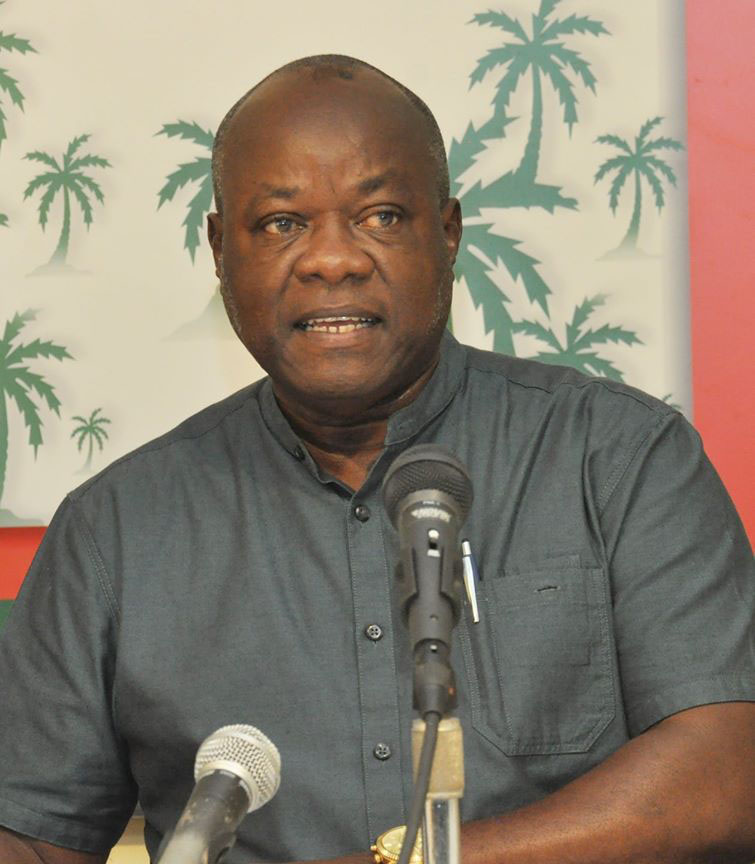Candidate for the leadership of the PNCR, Aubrey Norton says that he was on Saturday blocked by MoneyGram from receiving US$500 and does not believe it was regulatory procedures being adhered to but an abuse of this country’s anti-money laundering laws that speak to politically exposed persons.
“Yesterday when I went in, I said to the young lady, ‘I am here to collect’. She said to me to give her the reference number and I gave her the reference number. She said, `You are a politician, you are high up in politics and we can’t do nothing here. She said the only way I could get money is from the headquarters,” Norton told Stabroek News when contacted yesterday.
He had on Saturday taken to social media to call for a boycott of the remittance service here. “I had my own experience with political discrimination at MoneyGram this morning. I went to a MoneyGram location. I gave the cashier the reference number which she placed in the computer. She immediately said you are Aubrey Norton a political figure I can’t gave you any money since headquarters has to approve before I can pay you. She proceeded to tell me this is so because I am a political figure,” he said.
“I believe my right was violated and it needs to be in the public domain. No business should discriminate against anyone based on political affiliation. I wish to call on Guyanese generally to boycott MoneyGram and signal to them that political discrimination will not be tolerated and that there must be consequences for MoneyGram’s unacceptable and ludicrous behaviour,” he added.
Local remittance services are guided by the laws of the country alongside their own company’s risk management rules and as a reporting entity should inform Guyana’s Financial Intelligence Unit of flagged persons.
Persons receiving money in Guyana have to first give the remittance tracking number and must show a valid Passport or National Identification Card. They have to also correctly answer questions on who is the sender and the relationship with that person. The receiver has to also give their phone number, address and occupation and are all asked if they or family members are in active politics or are politically exposed persons.
A ‘politically exposed person’ takes the meaning as set out in the Anti-Money Laundering/Countering the Financing of Terrorism (AML/CFT) Act 2009, which states:- “any individual who is or has been entrusted with prominent public functions on behalf of a state, including a Head of State or of government, Senior politicians, senior government, judicial or military officials, senior executives of state owned corporations, important political party officials, including family members or close associates of the politically exposed person whether that person is resident in Guyana or not.”
Guyana’s Financial Intelligence Unit, which investigates money laundering, says that a politically exposed person, as per the definition provided by the AML/CFT Act, can be interpreted “very widely, as it covers a wide range of prominent functionaries, whether foreign, domestic, and present or past, including the family members and close associates of those prominent public officials.
“Given that the AML/CFT Act did not include a list of specified public positions, family members or associates that would be subject to the Act, it is critical that the reporting entity be always vigilant, and mindful of the levels of ML/TF risks associated with all PEPs across the various categories and apply mitigation measures accordingly,” the FIU states.
For example, “Important Political Party Officials”, include but are “not limited to- (a) Senior Members of established political parties, (b) Senior Political Party members (listed or registered for Government/National Electoral purposes who may or may not be elected to sit as Members of Parliament); (c) General Secretaries of Political Parties;(d) any person holding any of the above or equivalent position in a foreign country,” according to the agency.
But Norton says that the law says that there should be suspicion of money laundering and that US$500 would not qualify.
“I said to her that doesn’t make any sense to me and it not as if it is money to say money laundering; it was US$500. I told her I don’t need to go through that hassle and I call the person and told them to collect back their money and don’t use MoneyGram anymore. From the time I give the girl the number, the girl said you is a politician. I read the law. There is nothing in the law which says politicians are flagged. There must first be some reasonable suspicion of money laundering. I don’t understand. In my opinion, it was utter garbage. You can’t just from you put in my name tell me I is a politician and you got to wait until we get permission from headquarters and we can’t give you no money today,” he argued.
“Apart from the form of it, it was disrespectful, I think it was utter ignorance. One question and she blurted out. I am dead sure there are politicians that go there and get money without a question. So in my opinion, it is clearly a case of discrimination. There is nothing in the AML that says you have to scrutinize somebody because they are a politician. It is a violation of the Act. I have read the act and have never seen anything like that,” he added.
Told that remittance companies are not acting in isolation and that they could be sanctioned if slippages were found on their part, he said “any rationalization of that is pathetic…what you are telling me is ridiculous.”
MoneyGram’s website here states that “Services may be delayed, restricted or unavailable depending upon: Service selected; Agent hours; Transfer amount; currency availability; regulatory issues; lD requirements; hours and rules of participating banks regarding availability of funds, Otherwise, we make no representation as to when or if a Transfer will be delivered or accepted”.






